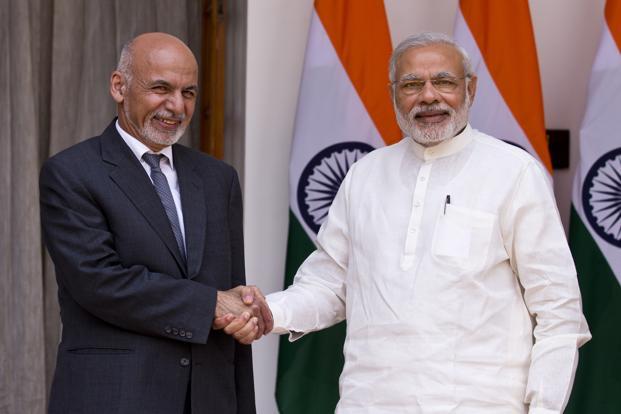Afghanistan Asks India For Military Assistance Again
President Ghani and PM Modi

NEW DELHI: According to a report in a leading Indian daily, Afghanistan has asked India to step up supplies of lethal equipment for its military. The request seems to have been made by Afghanistan’s national security advisor, Hanif Atmar, who visited New Delhi this week.
Atmar asked India for training equipment, air and ground mobility assets, engineering infrastructure and light infantry, sources said.
Last week, Russia confirmed that Kabul had asked for “certain types of assistance free of charge.”
Afghanistan’s move to reach out to its old allies comes in the wake of declining US support, as the US’ military assistance to Afghanistan has declined year on year since 2011, when it touched a high of over 10bn USD, to reach only 3.8bn USD for 2016.
India’s development assistance programme for Afghanistan stands at $2 billion, making the country one of the leading donor nations in Afghanistan.
This fact of India being a lead investor in the troubled nation points to the former’s “soft power” presence in the region - through investments in hospitals and institutional buildings (India built Afghanistan’s parliament), accords to train army and police officers, and other capacity building measures. It’s interest in the region is linked to Afghanistan emerging as an economic and energy link to Central Asia.
There has been concern in India in recent years on the lack of space accorded to it as far as Afghanistan is concern, despite the country making clear that it has strategic interests in the country. This year, India was left out as the US and China co-convened a high level meeting on Afghanistan’s peaceful development and regional cooperation.Months of efforts by both Pakistan and the U.S. to ease out differences and bring China on board finally bore fruit, with the first-of-its-kind meet being held on the sidelines of the United Nations General Assembly.
In the chair were the Chief Executive of Afghanistan Abdullah Abdullah, U.S. Secretary of State John Kerry, Chinese Foreign Minister Wang Yi, and Afghan Foreign Minister Salahuddin Rabbani. Those who participated in the talks were ministers from Turkey, Saudi Arabia, Iran,Australia, Italy, Norway.Kazakhstan. Pakistan was represented by National Security Advisor Sartaj Aziz. There was no sign of India, clearly not even invited as a participant.
The meeting: Expressed its strong support for the National Unity government in Afghanistan;
Welcomed steps taken to implement the reform agenda;
Reiterated support for an Afghan led and Afghan owned peace process;
Supported government efforts to further advance reconciliation with the Taliban and other armed groups;
Called upon these groups to enter into direct talks with the Afghan government;
China, US and Afghanistan reiterated their conviction that Afghanistan will never be used as a safe-haven for international terrorists and called for regional and international cooperation on this.
China has thus stepped in where India seems to have been afraid to tread. In that it has expanded its role from economic and financial assistance to a clearly strategic partnership, sitting on the same side of the table as the US on this issue. In the process that India, which seems to be happy with the “fondness” that the common Afghan reportedly has for Indians, seemed to be completely out of the picture as even two major competitors join hands to tackle the challenges posed by Afghanistan, and the fast deteriorating situation there.
China’s interest in Afghanistan shifted from the financial to the strategic about two years ago according to experts here. In fact the Wall Street Journal taking first note of the shift wrote: During Afghanistan’s tumultuous political transition last year, Chinese security officials began visiting Kabul regularly, and expressed concerns about militant havens, according to a former senior Afghan security official.
Franz-Michael Mellbin, the European Union envoy to Afghanistan, said he first noticed increased Chinese interest in Afghanistan in 2013. “They have been looking for an area to expand their foreign policy toolbox,” he said, “but also doing it in a way that would not be seen strategically threatening to the U.S.”
During an October conference on Afghanistan in Beijing, a Chinese general surprised some U.S. participants by suggesting the Pentagon inquire about a joint effort with China to train Afghan security forces, say people familiar with the matter.”
This was followed by a secret meeting of the Taliban in China in May this year, with the news being leaked at the time to the Wall Street Journal in the US. Top officials from Afghanistan and Pakistan were present at the meeting, that really became the turn point for full blown Chinese participation in the Afghan peace process. The US has been in close contact with Beijing with Secretary of State John Kerry speaking highly of the new found cooperation with China at the New York meeting just a day ago. He went on to describe China “as a country that understands very deeply the cross currents in Afghanistan.
Relations between China and Pakistan are close and strategic, leading to discomfort in New Delhi and also Washington, that the latter has clearly overcome. The Wall Street Journal quoted Hu Shisheng, an Afghanistan expert at the China Institutes of Contemporary International Relations, a think tank linked to the Ministry of State Security saysing that the training of Afghan forces outside Afghanistan by both US and China was seen as “feasible and realistic.” The two countries are jointly training diplomats as well.
Pakistan is supportive, with a foreign ministry statement from Islamabad maintaining earlier that the Sharif government will work closely with China to support the Afghan peace process. US media reports also suggest a lowering of tensions with senior officials being quoted as saying that they do not see China as a competitor to its relations with Afghanistan and Pakistan.
Given the above, it would be prudent to not make too much of the reported Afghan request to India for military assistance, as Pakistan, China and the US continue to remain the big players in the country.



